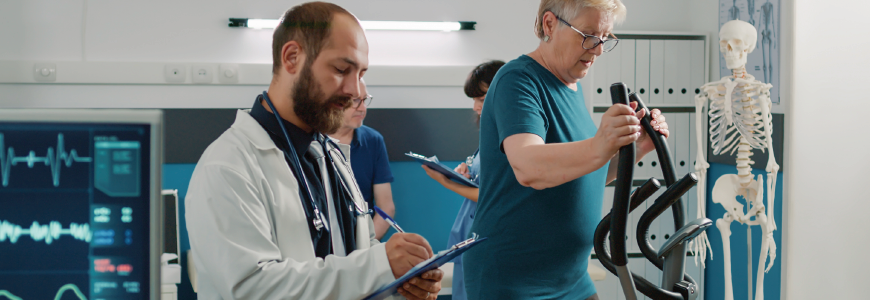Although cardiac rehabilitation (CR) has been the standard recommendation following many cardiac events for decades, supporting empirical research has been hampered by heterogeneity and poor data quality. New Duke research found a definitive benefit for CR, showing half as many rehospitalizations for patients who were able to attend sessions.
Reviewing charts for Duke patients who were eligible and able to use CR and controlling for confounding variables, Duke researchers found that those who attended five sessions of CR saw a 10% significantly reduced risk of all-cause readmission or death. Each session attended reduced the risk of readmission by 2%.
“This finding is truly profound,” says co-author William E. Kraus, MD, Duke cardiologist and medical director of the Duke Cardiac Rehabilitation Program. “We expected to see a benefit, but we were surprised by the magnitude of the effect.”
Identifying CR’s Effects
Researchers began by identifying Duke patients who were discharged following myocardial infarction, coronary artery bypass graft surgery, or percutaneous coronary intervention, according to the Medicare standards for CR. The study identified more than 2,600 qualifying adults who were discharged to home and lived within 50 miles of the CR facility.
Patients who attended at least one CR session were placed in the CR group, and statistical analyses were performed controlling for variables including age, sex, race, comorbidities, medications, and risk factors. “Previous studies in this area haven’t been able to control for all of these variables with the data coming from various sources. We were able to fine tune our database to understand all of the clinical elements that contributed to CR,” says Kraus. “We ran five different models, and we found that no matter what we added into the model, the effects persisted.”
With the ability to get the full picture of the patient’s course, the researchers felt confident in the findings for a treatment with a Class I indication where a randomized controlled trial is not feasible. “We think this is the closest you can get to finding the real answer,” says Kraus.
To refer a patient, call Duke Heart Center at 919-681-5816 or log into Duke MedLink.
Implementing CR for Patients
The vast majority of patients in the study did not attend any CR sessions. There are many reasons why patients may not participate in CR including the cost, the travel required, and other obligations such as caregiving.
“We have to find ways to help people overcome those barriers,” Kraus says. “As physicians, we must emphasize the importance of CR to our patients as this study has clearly shown. And health care systems should find ways to make CR more accessible to their patients, particularly by reducing unnecessary barriers and unduly expensive copays.”
